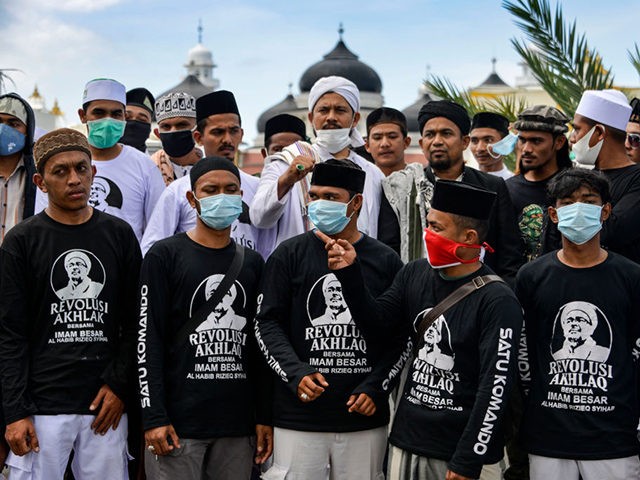The government of Indonesia announced Wednesday that an influential Islamist group called the Islamic Defenders Front, commonly known by its Indonesian acronym FPI, has been outlawed and ordered to suspend all activities.
FPI’s co-founder and “spiritual leader,” imam Rizieq Shihab, recently returned from three years of self-imposed “exile” in Saudi Arabia and was promptly arrested for violating coronavirus safety protocols.
”The government has banned FPI activities and will stop any activities carried out by FPI. The FPI no longer has legal standing as an organization,” announced security minister Mahfud MD. He explained the group was officially “disbanded” in June but persisted in organizing and conducting activities, so it has now been completely outlawed.
Deputy Justice Minister Edward Omar Sharif Hiariej added that the decision to outlaw FPI was made after 29 of its members were convicted of terrorism, and because its ideology conflicts with Indonesia’s official doctrine of “Pancasila.”
Pancasila includes five principles enshrined in the Indonesian constitution and represented on the national coat of arms. One of these principles can be interpreted as a commitment to religious freedom, although a great deal of Indonesian political drama over the years has been driven by competing interpretations of what the Five Principles mean, and how they should be implemented in law.
For example, one of the principles declares Indonesia should be united under “one God.” FPI has some very specific ideas about what name that one God should be called by, and who his most important prophet was. FPI’s leader Rizieq claims to be a direct lineal descendant of said prophet. The group therefore likes to invoke the Five Principles as justifying its extremism, rather than forbidding it.
FPI began in 1998 as a gang of self-appointed “moral guardians” with a propensity for attacking people and institutions they deemed immoral under Islamic law. By 2017 the group was powerful enough to bring down the popular Christian governor of Jakarta, Basuki “Ahok” Tjahaja Purnama, by accusing him of “blasphemy” and “insulting Muslims.”
Some FPI supporters demanded Ahok’s execution, but instead he spent two years in prison and recently re-entered Indonesian public life, including the chairmanship of Indonesia’s largest state-owned oil company.
Ahok’s return was mirrored by the decline of FPI’s fortunes and the fall of its firebrand leader Rizieq, although the group remains so influential in Indonesia that some observers doubt the government will be able to suppress it.
“Considering the popularity of the group and the widespread use of its symbols, the order will be difficult to enforce. Some will likely abandon it, but it will potentially radicalize others,” Ian Wilson of Australia’s Murdoch University told the New York Times on Wednesday.
“They can disband the FPI, but they cannot disband our struggle in defending the country and religion. If we want to, we can declare a new Islamic mass organization this afternoon. If it’s disbanded, we can make a new one continuously. Registered or not, we continue to exist,” declared a spokesman for the banned organization.
The blasphemy persecution of Jakarta’s governor might have been the high-water mark of FPI power, but it also alienated a great deal of the Indonesian public and political establishment, including many Muslims. The group still has many thousands of followers and a demonstrated ability to put them on the streets, which is one of the reasons Rizieq is in legal trouble.
Rizieq, 55, fled to Saudi Arabia in 2017 after he was hoist upon his own morality petard and named as a suspect in a pornography case, specifically for exchanging steamy chat message with a female supporter.
He returned to Indonesia in November after the charges were dropped (and the Saudis threatened to deport him.) Rizieq announced he was more dedicated to strict Islamist law than ever and urged his followers to launch a “moral revolution,” to the annoyance and alarm of President Joko Widodo’s government — which, like many others around the world, has its hands full with the coronavirus pandemic and accompanying economic recession.
Rizieq was greeted by tens of thousands of cheering supporters when he landed in Jakarta on November 10, a large enough throng to clog highways, shut down the airport, and violate every conceivable coronavirus safety protocol. Rizieq doubled down by inviting ten thousand people to attend his daughter’s wedding a few days later. Two high-ranking police officials lost their jobs for letting him proceed with the wedding event.
Rizieq continued holding mass events in defiance of the government and flouting its mandatory coronavirus testing requirements, threatening violence against “blasphemers” — he warned the notorious beheading of a French schoolteacher by an Islamist student in October was a taste of things to come in Indonesia if the authorities didn’t start arresting everyone who insults Islam — and generally agitating against the Widodo administration. The Indonesian military began describing FPI as a subversive organization and terrorist threat.
On December 7, six of Rizieq’s bodyguards died in a shootout with police officers who were tailing them. The officers were following Rizieq’s convoy because they feared he was trying to organize a mass demonstration or terrorist attack on a police station where he was due to answer questions about his violations of coronavirus safety rules.
Two of the cars in Rizieq’s convoy blocked a police car and approached the officers with a machete, sickles, and at least one illegal firearm. The officers said they shot in self-defense, but the FPI described the dead bodyguards as the victims of “extra-judicial killings.” Rizieq himself is in police custody while the investigation proceeds.

COMMENTS
Please let us know if you're having issues with commenting.